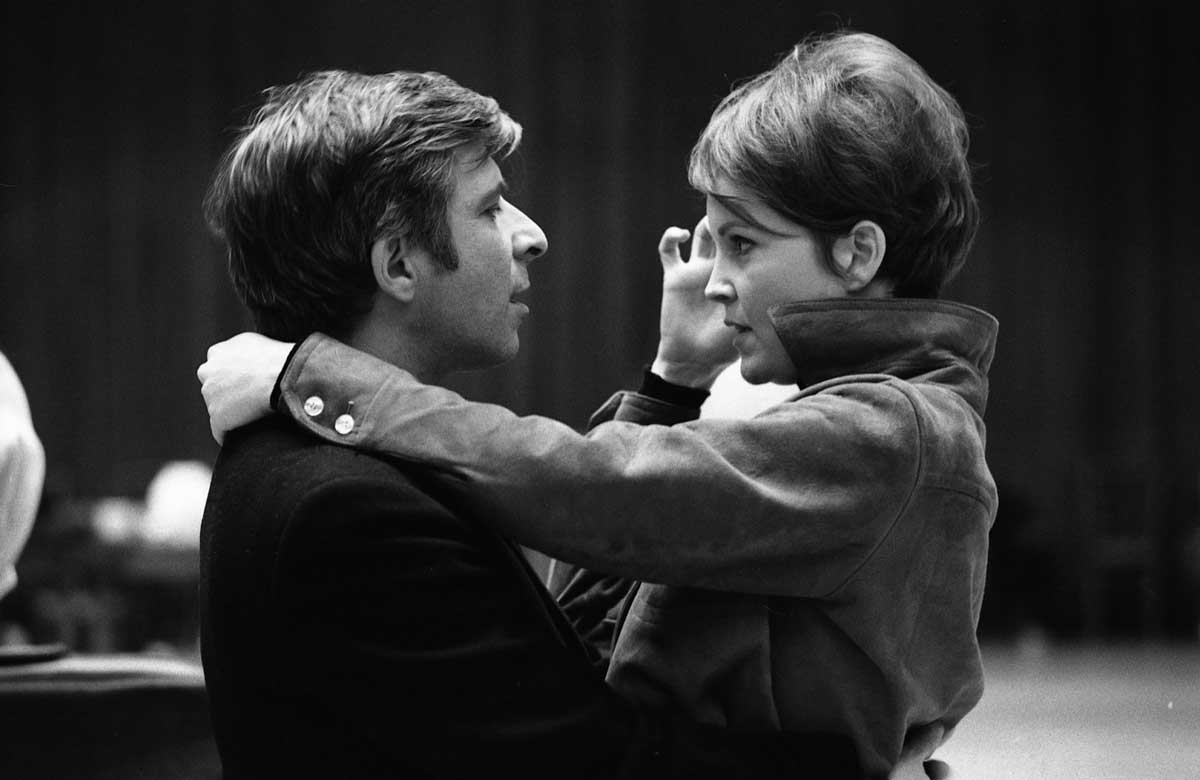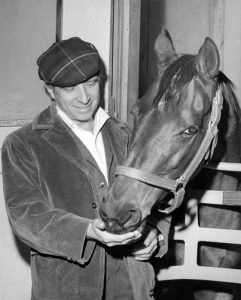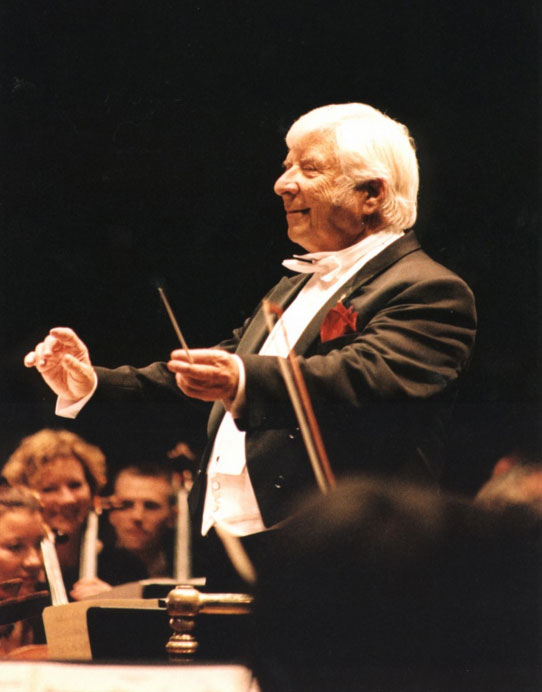
Composer Elmer Berntsein worked with actress Marlyn Mason on the 1967 Broadway play How Now Dow Jones, available from the Broadway Masterwork labels. (Photo: Henry Daum / Sony Music Entertainment)
The composer behind films as diverse as The Magnificent Seven and Animal House will be feted on the 95th anniversary of his birth with landmark concerts, in London and Dublin. “Elmer Bernstein: 50 Years of Film Music” will be narrated and conducted by his son Peter Bernstein and narrated and hosted by film director John Landis. The retrospective will celebrate works spanning five decades and involvement in more than 200 pieces for film and television.
On Wednesday, June 14, the RTÉ Concert Orchestra of Dublin will pay tribute with some of Bernstein’s most beloved music from films including The Great Escape and The Magnificent Seven, as well as scores originally recorded in Dublin such as My Left Foot and The Grifters. Peter will share personal stories about his father’s time in Ireland as well as his career in Hollywood.
The celebration moves to the Royal Albert Hall on Father’s Day, Sunday, June 18, when the Royal Philharmonic Concert Orchestra will perform some greatest hits and a few rare works never before performed in that city, including An American Werewolf in London. Peter and John will be sharing reminiscences and items of historical importance from the Bernstein archive particular to Bernstein’s time in London and his work with the RPO, which he conducted on his 80th birthday in 2002. Elmer Bernstein died in 2004.
Peter Bernstein said he is particularly excited “to be able to present a number of new arrangements and some never-heard-before in concert pieces of music at these concerts. “From the moody horror of An American Werewolf in London, to the driving 50s jazz of Sweet Smell of Success, to The Great Escape we are tying to touch as many areas as we can from an eclectic and unique 54 year career.”
Elmer Bernstein (no relation to Leonard) is the only person to be nominated for an Academy Award in every decade from the 1950’s to the 2000’s. His sole win was for 1967’s Thoroughly Modern Millie. But during his productive career he was revered in Hollywood for a commercial sensibility that allowed him to be as effective on a film like Martin Scorsese’s period drama The Age of Innocence as on lighthearted romps like the Jim Abrams/Jerry Zucker-directed ‘ Airplane! and Ivan Reitman’s Ghostbusters.
“It’s one thing to write music that reinforces a film, underscores it…It’s entirely another to write music that graces a film. That’s what Elmer Bernstein does,” Scorsese once said about his collaborator. Bernstein often conducted the films he scored, including Scorsese’s Bringing Out The Dead (1999) and — working from an original composition by Bernard Hermann, which he adapted — Cape Fear (1991), as well as Jim Sheridan’s My Left Foot (1989).
With Landis, Bernstein collaborated on seven films: Animal House, The Blues Brothers, An American Werewolf in London, Trading Places, Spies Like Us, ¡Three Amigos!, and Oscar.
Bernstein composed more than 150 original movie scores and nearly 80 for television, creating some of the most recognizable and memorable themes in Hollywood history: the driving jazz of The Man With the Golden Arm, the rousing Western anthem of The Magnificent Seven, and the lyrical and quietly moving music of To Kill a Mockingbird. His impeccable timing was showcased in some of the most beloved comedies, like Airplane, Ghostbusters, and Stripes. The jaunty, thumb-nosing march of The Great Escape has become the anthem for the England National Football Team.
The Early Days
Born in New York of Ukrainian immigrant parents on April 4, 1922, he was originally destined for a career as a concert pianist. Encouraged by Aaron Copland, he also undertook composition studies with several important teachers including Roger Sessions and Stefan Wolpe.

Bernstein in 1964 with his first racehorse, Calgade, at Santa Anita. (Photo courtesy of the Elmer Bernstein Family Trust)
World War II intervened, and the young pianist/composer, now enlisted in the Army Air Force got his first taste of writing music for drama by working on their radio shows produced to keep the public engaged in the war effort. His post-war break came in 1950 when an Air Force friend, now in Hollywood, hired him to compose the score for a film he had written called Saturday’s Hero. The next year, his music for the Joan Crawford thriller, Sudden Fear, attracted critical attention. However, by 1953, he found himself caught up in the Hollywood Blacklist and was virtually unemployable.
Bernstein wound up composing for ultra-low-budget Sci-Fi movies (Robot Monster and Cat Women Of the Moon), and working as a rehearsal pianist for the ballet sequences in the film version of Oklahoma! Then in 1955 a studio music executive, returning a favor, recommended Bernstein to Cecil B. De Mille, then shooting The Ten Commandments and who needed ancient-sounding music for dances in the film. When Victor Young, who had originally been signed to compose the dramatic score, dropped out due to health reasons, Bernstein got the assignment. DeMille, one of Hollywood’s most ardent anti-communists, also saved Bernstein from the Blacklist (he never was a Communist Party member) by vouching for him to the F.B.I.
During the year and a half that he was working on The Ten Commandments, he also composed the groundbreaking jazz score for The Man With the Golden Arm for director Otto Preminger.
The soundtrack album for Man With the Golden Arm shot to No. 2 on the Billboard album charts in 1956, becoming one of the first hit movie soundtracks. These scores catapulted Bernstein onto the “A” list of Hollywood composers. Golden Arm won him his first of 14 Oscar nominations and launched a series of jazz-oriented Bernstein scores, including Sweet Smell of Success, The Rat Race, TV’s Staccato and Walk on the Wild Side.
The jazz scores, plus the spate of Westerns and dramas that would dominate the composer’s work throughout the ’60s, helped to solidify his reputation as a master of musical Americana.
Meanwhile, Bernstein’s close relationship with producer Alan J. Pakula and director Robert Mulligan led to one of his most memorable scores, and for one of the finest American movies ever made: To Kill a Mockingbird. His understated music, composed for a chamber-sized ensemble rather than the more traditional full orchestra, quickly became a new model for film composers.
Bernstein’s versatility as a composer was again demonstrated when, the very next year, he created another classic with the theme for The Great Escape, a fact-based World War II adventure film about Allied soldiers who plan an elaborate escape from a prisoner-of-war camp.
An Industry Leader
Throughout his career, Bernstein took on a number of leadership roles, including stints as vice president of the Academy of Motion Picture Arts & Sciences, president of the Young Musicians Foundation, president of The Film Music Society and, most significantly, a decade-long tenure as president of the now-defunct Composers and Lyricists Guild of America during the 1970s—where he fought a lengthy, and expensive battle against the studios in an effort to restore composers rights to their music for movies and TV.
Also in the 1970s Bernstein singlehandedly invented the now-flourishing business of releasing old film scores when invested his own money in “Elmer Bernstein’s Film Music Collection,” conducting a series of recordings of classic scores, many of which had never been released on record before.
Bernstein’s career took a surprising turn in 1978, thanks to a call from his son Peter’s old school friend, John Landis. Landis, then 27 and a film director, asked Bernstein to score his raucous college comedy Animal House starring John Belushi.

Elmer Bernstein conducts the Royal Philharmonic Orchestra for his 80 birthday in 2002 at London’s Royal Albert Hall. (Photo courtesy the Elmer Bernstein Family Trust)
Almost overnight, Bernstein became Hollywood’s go-to composer for comedies. They included Airplane!, The Blues Brothers (John Belushi and Dan Aykroyd), Stripes (Bill Murray), and Ghostbusters (Dan Aykroyd and Bill Murray). For the 1983 comedy, Trading Places, starring Eddie Murphy and Dan Aykroyd, Bernstein created a score based on Mozart’s The Marriage of Figaro, for which he would receive an Oscar nomination for Best Adaptation Score.
Tiring of comedy work, Bernstein sought to return to his dramatic roots. The Grifters (1990) marked his first work with Martin Scorsese, who was a producer on the con-artist film starring Anjelica Huston, John Cusack and Annette Bening.
For Scorsese as director, Bernstein adapted Bernard Herrmann’s original Cape Fear score for the 1991 remake and provided the musical atmosphere for Bringing Out the Dead. He received a 1993 Oscar nomination for his elegant score for Scorsese’s The Age of Innocence.
In person, Bernstein was warm and approachable, thoughtful and fun-loving; and despite 50 years of being “in the biz,” he was surprisingly enthusiastic about every new assignment. Actor Edward Norton, who hired Bernstein for his first film as a director (Keeping the Faith, 2000), said: “He is one of the most vibrant people I’ve worked with. It’s his very youthful enthusiasm that makes it so invigorating to work with him. He brings the full depth of his classical training and classic Hollywood experience to the table—but he brings with it the energy of a 28-year-old.”
Bernstein’s last major film score was for the critically praised, Todd Haynes-directed drama, Far From Heaven, starring Julianne Moore and Dennis Haysbert. It earned him his final Academy Award nomination in 2002.


Comments are closed.